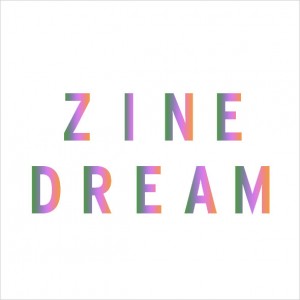- Various Makers
- Zine Dream
- (August 2-4, 2013)
- Toronto, ON
- ::web/zines::
To celebrate this weekend's Zine Dream, Toronto's much-loved annual small press art fair, we met with two vendors: Pavan Brar chatted with Tomas Del Balso about philosophy and space cats, while Jordan Voith met briefly with Jenn Kitagawa via interwebs. For our Toronto friends, we'll be tabling next to the good folks from Offerings and hope to see you there!
Jenn Kitagawa!
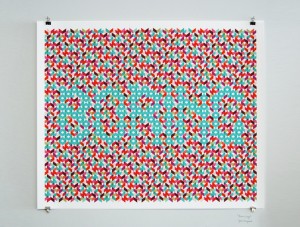
Jenn Kitagawa grew up in Edmonton, AB, before moving to Calgary to complete a degree at ACAD. She lived in New York briefly in the fall of 2011 and moved to Toronto later that year. She recently quit a full time gig at a Toronto-based design firm and is currently exploring a number of potential paths, including freelance work, not-for-profit endeavours, and possibly founding a web design company. This is Jenn’s first year at Zine Dream. She was introduced to the festival by co-creator, Jesjit Gill, and decided it was a good opportunity to “make a bunch of things” she wouldn’t have gotten around to otherwise. “It’s more fun to be a part of than to spectate,” she said and there’s a “difference between actually doing and thinking of doing.” Jenn is bringing a number of pieces to Zine Dream: A self-published zine called “Pattern and Pessimism”, which juxtaposes a series of cheery patterns and prints with various pessimistic slogans born of negative self-talk; a zine completed in conjunction with Britton Proulx under the Candy Drawer moniker – it’s called “Look What I’ve Zine” and it features collaborative illustrations and personal projects; and some other projects including wooden buttons, silk-screen prints, and a tote-bag. She is very excited about the tote-bag! WC: The zine, at least through the majority of its history, is often recognized largely as a literary art-form. Your work is typically more visual. What attracted you to the zine as a medium? JK: I don’t think zines have to be literary in nature. I’ve always communicated best through visuals, and although I do write for myself, I don’t write for public purposes. I’ve always been interested in zines, but mostly the ones that are illustration based. I’m less about the written content than the visuals. My zines actually contain very little writing.
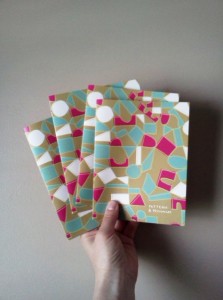
Order from Chaos: Hanging out with Tomas Dal Balso (by Pavan Brar)
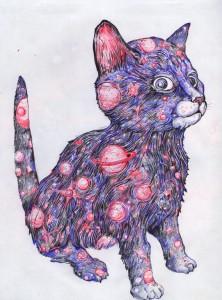
Tomas Del Balso grew up in Brampton, Ontario, and moved to Toronto when he was 19 years old. At this time, he began attending OCAD, later completing his degree there with a thesis on the portability and temporality of art and drawings. Tomas can trace his strong inclination towards the visual arts to about when he was 4 years old; his drive to express and make external that which has internal origins, however, has not been limited to the visual, as Tomas is quite the prolific musician as well. Tomas started playing music at the beginning of high school with long time friend Mike Claxton, with who he would later go on to play in DD/MM/YYYY. Though his former band disbanded in 2011, playing their final show in Toronto on 11/11/11, Tomas has been keeping himself busy with his endeavors in both the musical and visual creative fields. In addition to his work being displayed during Zine Dream, Tomas will be doing an installation at the Electric Eclectics festival in Meaford. His new band, Rotzig (German for ‘snot’), played their first show recently, and we can expect to hear some recordings by them in around “two months, tops.” As a part of Weird Canada’s involvement with Zine Dream, I had the chance to meet with Tomas and ask him a few quick questions about himself, and his involvement with the festival. WC: What do you like most about Zine Dream? TDB: The people first…. you have all these people who are passionate about making stuff, and then there’s the people who come in. WC: What are you looking forward to seeing? TDB: Half the people who are there, I love seeing them. Peter Kalyniuk, actually, I love that guy. [He’s] a really cool dude... I think he’s really dedicated and too humble….I feel like he should be really rich right now or something. I love his work. WC: What are you bringing to Zine Dream? TDB: I have a 200 hundred drawing compilation book. I will have new t-shirts and recent posters you can see on my website, and zines. I don’t work exclusively in zines or anything like that, it’s an outlet. I took book making in OCAD, and I think this one will incorporate that kind of skill. WC: Your two main modalities of expression are visual art and music—do you think, as far as you can tell, that when you create in either medium, that what you are expressing comes from the same place—as in, the same place or of the same ‘contents of the psyche’? TDB: Yeah, for sure. I think you answered the question with the question. For me getting over the whole Roman Catholic faith was a big thing, and it was almost like getting over magic, and that sent my mind into a whole new place. …I think my biggest problem is finding out the obvious ways they connect, but they do connect. I found that when I burn myself on one, I immediately walk over and do the other…I’ll go jam at my space until I’m physically tired, and then I’ll go right to my house and I have a canvas in my bedroom that I’ve been working on for the last month, and I’ll just sit down and relax, and I’ll start working on it very slowly.” This last question that I asked Tomas opened up a discussion that would be rather difficult to succinctly capture with a couple of quotations, and because it lead us from one concept to the next, repeating it verbatim wouldn’t make a lot of sense. A major theme, however, as far as I can interpret our conversation, seemed to be the continuity between life, experience, and art: TDB: It keeps me stronger to make work, and you have that feedback between what I’m going through and putting it in [work]…even the lyrics to a lot of songs, when I look back at them, I sort of write them automatically. I look at them and it’s sort of explaining my ego, or my sense of right or wrong, WC: Like your registry of things, or interpretation of life? TDB: “Yeah, exactly. And the best I can do is just feel honest about things, or feel that that is me...and just keep at it.” When I met up with Tomas, we spent around 30 minutes talking over Zine Dream and his background in visual arts, getting through all the information that’s relevant to the festival that you see above. However, it’s the stuff we talked about in between these questions, the stuff that related to my last question, and the stuff after the formal interview that really made this a great meeting. Tomas expressed a deep interest in a variety of topics such as Jungian Psychology, the ideas of Terrence McKenna, as well as Cymatics, and it seems that his interest in these ways to interpret and talk about the Self and the world, taken with his own experiences, all filter into his art and creative processes. Like he mentioned, breaking away from the Roman Catholic faith was quite poignant to his personal and artistic development, and this is only naturally so. For, when we get past being fixated on one specific paradigm for looking at and the understanding the world, like the one provided to us by a certain religious upbringing, we make room for the use of others. We open ourselves up to seeing things through different modes of representations, and learn to organize information and interpret things differently, potentially granting us with a new understanding of things. This process of change, for someone who seeks to express their interaction with themselves and the world through creative means, will inevitably have implications and consequences on the processes used to create, and the content that is being communicated.
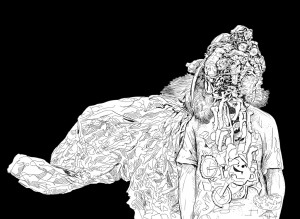
Pour célébrer Zine Dream, la très appréciée foire d’art des petites presses qui sera tenue à Toronto ce weekend, on rencontre deux vendeurs: Pavan Brar a discuté philosophie et chats de l’espace avec Tomas Del Balso, alors que David Steinberg a brièvement rencontré Jenn Kitagawa via les internets. Pour nos amis de Toronto, on montera notre table à côté du bon monde de Offerings et on espère vous y voir!
Jenn Kitagawa!
 Jenn Kitagawa a grandi à Edmonton en Alberta, avant de déménager à Calgary pour compléter un baccalauréat au ACAD. Elle a vécu brièvement à New York à l’automne 2011, pour ensuite déménager à Toronto plus tard au cours de la même année. Elle a récemment quitté un boulot à temps plein dans une firme de *design* de Toronto et explore maintenant diverses avenues potentielles, comme par exemple le travail indépendant, des entreprises à but non lucratif, et peut-être même l’établissement d’une compagnie de création de sites web.
C’est la première année de Jenn à Zine Dream. Elle a été introduite au festival par son by co-créateur, Jesjit Gill, et a décidé que c’était une excellente opportunité pour “faire un tas de trucs” qu’elle n’aurait autrement jamais trouvé le temps de faire. “C’est plus agréable d’y participer que d’y assister” dit-elle, et il y a une “différence entre vraiment le faire et penser à le faire.”
Jenn contribue un bon nombre de pièces à Zine Dream: Un *zine* qu’elle a publié à son compte, appelé «Pattern and Pessimism», qui juxtapose une série de motifs joyeux et une panoplie de slogans pessimistes nés de discours intérieurs négatifs, ainsi qu’un *zine* complété avec Britton Proulx sous le nom Candy Drawer – celui-là est intitulé «Look What I’ve Zine» et utilise des illustrations collaboratives et des projets personnels, ainsi que d’autres projets variés, incluant des boutons de bois, des impressions en sérigraphie, et un sac fourre-tout. Jenn est super enthousiaste à propos du sac fourre-tout!
WC: Le *zine* est largement reconnu comme étant une forme d’art littéraire, ou du moins l’a été au cours de la majeure partie de son histoire. Typiquement, ton travail est plutôt visuel. Qu’est-ce qui t’a attiré vers le *zine* en tant que médium?
«Je ne pense pas que les *zines* doivent nécessairement avoir une nature littéraire. J’ai toujours mieux communiqué par le visuel, et même si j’écris pour moi-même, je n’écris pas avec le public en tête. J’ai toujours été intéressée par les *zines*, mais surtout ceux qui ont pour base les illustrations. Je suis moins portée sur le contenu écrit que sur l’aspect visuel. En fait, mes *zines* ne contiennent que très peu d’écriture.»
Jenn Kitagawa a grandi à Edmonton en Alberta, avant de déménager à Calgary pour compléter un baccalauréat au ACAD. Elle a vécu brièvement à New York à l’automne 2011, pour ensuite déménager à Toronto plus tard au cours de la même année. Elle a récemment quitté un boulot à temps plein dans une firme de *design* de Toronto et explore maintenant diverses avenues potentielles, comme par exemple le travail indépendant, des entreprises à but non lucratif, et peut-être même l’établissement d’une compagnie de création de sites web.
C’est la première année de Jenn à Zine Dream. Elle a été introduite au festival par son by co-créateur, Jesjit Gill, et a décidé que c’était une excellente opportunité pour “faire un tas de trucs” qu’elle n’aurait autrement jamais trouvé le temps de faire. “C’est plus agréable d’y participer que d’y assister” dit-elle, et il y a une “différence entre vraiment le faire et penser à le faire.”
Jenn contribue un bon nombre de pièces à Zine Dream: Un *zine* qu’elle a publié à son compte, appelé «Pattern and Pessimism», qui juxtapose une série de motifs joyeux et une panoplie de slogans pessimistes nés de discours intérieurs négatifs, ainsi qu’un *zine* complété avec Britton Proulx sous le nom Candy Drawer – celui-là est intitulé «Look What I’ve Zine» et utilise des illustrations collaboratives et des projets personnels, ainsi que d’autres projets variés, incluant des boutons de bois, des impressions en sérigraphie, et un sac fourre-tout. Jenn est super enthousiaste à propos du sac fourre-tout!
WC: Le *zine* est largement reconnu comme étant une forme d’art littéraire, ou du moins l’a été au cours de la majeure partie de son histoire. Typiquement, ton travail est plutôt visuel. Qu’est-ce qui t’a attiré vers le *zine* en tant que médium?
«Je ne pense pas que les *zines* doivent nécessairement avoir une nature littéraire. J’ai toujours mieux communiqué par le visuel, et même si j’écris pour moi-même, je n’écris pas avec le public en tête. J’ai toujours été intéressée par les *zines*, mais surtout ceux qui ont pour base les illustrations. Je suis moins portée sur le contenu écrit que sur l’aspect visuel. En fait, mes *zines* ne contiennent que très peu d’écriture.»

De l’ordre dans le chaos: Une discussion avec Tomas Del Balso (par Pavan Brar)
 Tomas Del Balso a grandi à Brampton en Ontario, et a déménagé à Toronto quand il avait 19 ans. C’est à ce moment qu’il a commencé ses cours à OCAD, complétant plus tard son baccalauréat avec une thèse sur la portabilité et la temporalité de l’art et du dessin. Tomas peut retracer sa forte inclination pour les arts visuels à ses 4 ans, mais sa volonté à exprimer et rendre visible ce qui origine de l’intérieur n’est pourtant pas limité au visuel, puisque Tomas est aussi un musicien prolifique. Tomas a commencé à jouer de la musique au début de son secondaire, avec Mike Claxton, un ami de longue date avec qui il a plus tard joué dans le groupe DD/MM/YYYY. Bien que le groupe se soit dissout en 2011, jouant leur dernier spectacle à Toronto le 11/11/11, Tomas est resté occupé avec ses entreprises dans les champs créatifs. En plus du travail qui sera exposé pendant Zine Dream, Tomas fera une installation au festival Electric Eclectics de Meaford. Son nouveau groupe, Rotzig (‘morve’ en allemand), ont joué leur premier spectacle, et on peut s’attendre à entendre leurs enregistrements dans «deux mois, tout au plus». Grâce à l’implication de Weird Canada avec Zine Dream, j’ai eu la chance de rencontrer Tomas pour lui poser quelques questions à propos de lui-même et de sa participation au festival.
WC: Qu’est-ce que tu aimes le plus de Zine Dream?
TDB: «Premièrement, les gens…. Vous avez tous ces gens qui sont passionnés de faire des trucs, et ensuite il y a ceux qui viennent nous voir. »
WC: Qu’est-ce que tu as hâte de voir?
TDB: «La moitié des gens qui seront là, j’aime les voir. Peter Kalyniuk, en fait, j’aime ce gars. [C’est] un gars vraiment *cool*…Je pense qu’il est très dévoué et trop modeste….J’ai l’impression qu’il devrait être très riche en ce moment, ou quelque chose. J’aime son travail. »
WC: Qu’est-ce que tu amènes à Zine Dream?
TDB: «J’ai un livre de compilation de 200 de mes dessins. Je vais avoir des nouveaux t-shirts et des posters récents que vous pouvez voir sur mon site web, et des *zines*.Je ne travaille pas seulement avec des *zines*, vraiment, c’est un exutoire créatif. J’ai appris comment faire des livres à OCAD, et je pense que celui-ci va intégrer ce genre de savoir-faire.»
WC: Tes deux modes d’expression principaux sont les arts visuels et la musique— est-ce que tu penses, d’autant que tu saches, que quand tu créés dans l’un ou l’autre de ces médiums, ce que tu exprimes provient du même endroit—du même « contenu de la psyché »?
TDB: «Oui, c’est sûr. Je pense que tu as répondu à la question avec la question. Pour moi, en revenir de toutes les croyances catholiques était quelque chose d’énorme, c’était presque comme d’en finir avec la magie, et ça a envoyé mon esprit dans une toute nouvelle direction. …Je pense que mon plus gros problème est de trouver ce qui relie ces médiums de façon évidente, mais ils sont reliés. J’ai découvert que quand je m’épuise sur l’un, je vais immédiatement vers l’autre…Je vais aller *jammer* à mon local jusqu’à ce que je sois physiquement fatigué, puis je vais aller directement à la maison, où j’ai une toile dans ma chambre sur laquelle je travaille depuis un mois, et je vais juste m’asseoir, relaxer, et commencer à y travailler tranquillement »
La dernière question que je pose à Tomas ouvre une discussion qu’il serait plutôt difficile de capturer de manière concise à l’aide de quelques citations, et parce qu’elle nous a amené d’un concept à l’autre, la transcrire mot pour mot n’aurait pas beaucoup de sens. Un thème important, cependant, semble être la continuité entre la vie, l’expérience, et l’art :
TDB: «Ça me garde plus fort de travailler, et quand il y a cette continuité entre ce que je vis et ce que je mets dans mon [travail]…même les paroles de plusieurs de mes chansons, quand j’y repense, je les ai écrites de façon automatique, en quelque sorte. Je les lis et ça explique un peu mon égo, ou mon discernement moral. »
WC: Comme ta façon de percevoir les choses, ou ton interprétation de la vie?
TDB: «Oui, exactement. Et le mieux que je puisse faire, c’est de me sentir honnête, ou de sentir que je suis moi-même...Et de persister. »
Quand j’ai rencontré Tomas, nous avons passé environ une demi-heure à parler de Zine Dream et de son expérience en arts visuels, et à ramasser toutes les informations pertinentes au festival que vous avez lu plus haut. Cependant, c’est ce de quoi on a discuté entre les questions, sa réponse à ma dernière question, et tout ce qui s’est passé après l’entrevue formelle qui ont fait de cette rencontre quelque chose de formidable. Tomas a démontré un intérêt poussé pour toute une variété de sujets, tels que la psychologie jungienne, les idées de Terrence McKenna, ou encore l’étude des sons, et il semble que son intérêt pour ces façons d’interpréter et de parler du soi et du monde, en plus de ses propres expériences, filtrent dans son art et dans ses processus créatifs. Comme il l’a mentionné, se défaire de la foi catholique a naturellement été un moment poignant de son développement personnel et artistique. Quand on arrête d’être obsédé par un paradigme spécifique à travers lequel on observe et comprend le monde, comme celui que nous fournit une éducation religieuse, on fait de la place pour de nouvelles perceptions. On est ouvert à voir la vie à travers différents modes de représentations, et on apprend à organiser et à interpréter les choses différemment, nous permettant potentiellement d’adopter un regard neuf. Ce processus de changement, pour quelqu’un qui cherche à exprimer ses interactions avec lui-même et avec le monde par une avenue créative, aura inévitablement des implications et des conséquences sur la façon de créer, et sur le contenu qui est ainsi communiqué.
Tomas Del Balso a grandi à Brampton en Ontario, et a déménagé à Toronto quand il avait 19 ans. C’est à ce moment qu’il a commencé ses cours à OCAD, complétant plus tard son baccalauréat avec une thèse sur la portabilité et la temporalité de l’art et du dessin. Tomas peut retracer sa forte inclination pour les arts visuels à ses 4 ans, mais sa volonté à exprimer et rendre visible ce qui origine de l’intérieur n’est pourtant pas limité au visuel, puisque Tomas est aussi un musicien prolifique. Tomas a commencé à jouer de la musique au début de son secondaire, avec Mike Claxton, un ami de longue date avec qui il a plus tard joué dans le groupe DD/MM/YYYY. Bien que le groupe se soit dissout en 2011, jouant leur dernier spectacle à Toronto le 11/11/11, Tomas est resté occupé avec ses entreprises dans les champs créatifs. En plus du travail qui sera exposé pendant Zine Dream, Tomas fera une installation au festival Electric Eclectics de Meaford. Son nouveau groupe, Rotzig (‘morve’ en allemand), ont joué leur premier spectacle, et on peut s’attendre à entendre leurs enregistrements dans «deux mois, tout au plus». Grâce à l’implication de Weird Canada avec Zine Dream, j’ai eu la chance de rencontrer Tomas pour lui poser quelques questions à propos de lui-même et de sa participation au festival.
WC: Qu’est-ce que tu aimes le plus de Zine Dream?
TDB: «Premièrement, les gens…. Vous avez tous ces gens qui sont passionnés de faire des trucs, et ensuite il y a ceux qui viennent nous voir. »
WC: Qu’est-ce que tu as hâte de voir?
TDB: «La moitié des gens qui seront là, j’aime les voir. Peter Kalyniuk, en fait, j’aime ce gars. [C’est] un gars vraiment *cool*…Je pense qu’il est très dévoué et trop modeste….J’ai l’impression qu’il devrait être très riche en ce moment, ou quelque chose. J’aime son travail. »
WC: Qu’est-ce que tu amènes à Zine Dream?
TDB: «J’ai un livre de compilation de 200 de mes dessins. Je vais avoir des nouveaux t-shirts et des posters récents que vous pouvez voir sur mon site web, et des *zines*.Je ne travaille pas seulement avec des *zines*, vraiment, c’est un exutoire créatif. J’ai appris comment faire des livres à OCAD, et je pense que celui-ci va intégrer ce genre de savoir-faire.»
WC: Tes deux modes d’expression principaux sont les arts visuels et la musique— est-ce que tu penses, d’autant que tu saches, que quand tu créés dans l’un ou l’autre de ces médiums, ce que tu exprimes provient du même endroit—du même « contenu de la psyché »?
TDB: «Oui, c’est sûr. Je pense que tu as répondu à la question avec la question. Pour moi, en revenir de toutes les croyances catholiques était quelque chose d’énorme, c’était presque comme d’en finir avec la magie, et ça a envoyé mon esprit dans une toute nouvelle direction. …Je pense que mon plus gros problème est de trouver ce qui relie ces médiums de façon évidente, mais ils sont reliés. J’ai découvert que quand je m’épuise sur l’un, je vais immédiatement vers l’autre…Je vais aller *jammer* à mon local jusqu’à ce que je sois physiquement fatigué, puis je vais aller directement à la maison, où j’ai une toile dans ma chambre sur laquelle je travaille depuis un mois, et je vais juste m’asseoir, relaxer, et commencer à y travailler tranquillement »
La dernière question que je pose à Tomas ouvre une discussion qu’il serait plutôt difficile de capturer de manière concise à l’aide de quelques citations, et parce qu’elle nous a amené d’un concept à l’autre, la transcrire mot pour mot n’aurait pas beaucoup de sens. Un thème important, cependant, semble être la continuité entre la vie, l’expérience, et l’art :
TDB: «Ça me garde plus fort de travailler, et quand il y a cette continuité entre ce que je vis et ce que je mets dans mon [travail]…même les paroles de plusieurs de mes chansons, quand j’y repense, je les ai écrites de façon automatique, en quelque sorte. Je les lis et ça explique un peu mon égo, ou mon discernement moral. »
WC: Comme ta façon de percevoir les choses, ou ton interprétation de la vie?
TDB: «Oui, exactement. Et le mieux que je puisse faire, c’est de me sentir honnête, ou de sentir que je suis moi-même...Et de persister. »
Quand j’ai rencontré Tomas, nous avons passé environ une demi-heure à parler de Zine Dream et de son expérience en arts visuels, et à ramasser toutes les informations pertinentes au festival que vous avez lu plus haut. Cependant, c’est ce de quoi on a discuté entre les questions, sa réponse à ma dernière question, et tout ce qui s’est passé après l’entrevue formelle qui ont fait de cette rencontre quelque chose de formidable. Tomas a démontré un intérêt poussé pour toute une variété de sujets, tels que la psychologie jungienne, les idées de Terrence McKenna, ou encore l’étude des sons, et il semble que son intérêt pour ces façons d’interpréter et de parler du soi et du monde, en plus de ses propres expériences, filtrent dans son art et dans ses processus créatifs. Comme il l’a mentionné, se défaire de la foi catholique a naturellement été un moment poignant de son développement personnel et artistique. Quand on arrête d’être obsédé par un paradigme spécifique à travers lequel on observe et comprend le monde, comme celui que nous fournit une éducation religieuse, on fait de la place pour de nouvelles perceptions. On est ouvert à voir la vie à travers différents modes de représentations, et on apprend à organiser et à interpréter les choses différemment, nous permettant potentiellement d’adopter un regard neuf. Ce processus de changement, pour quelqu’un qui cherche à exprimer ses interactions avec lui-même et avec le monde par une avenue créative, aura inévitablement des implications et des conséquences sur la façon de créer, et sur le contenu qui est ainsi communiqué.

